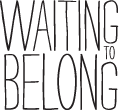Talking to your child about adoption
Celebrating adoption while easing your child's sense of loss
By Wendy Kittlitz
As adoptive parents, our view of adoption is primarily positive. Even though we may have been motivated by infertility or by compassion for children in need, our choice to adopt brings satisfaction and fulfillment, even when it is trying.
For our children, however, adoption brings with it loss as well as gain. As a child develops, this sense of loss will become increasingly apparent.
Our task, then, in discussing adoption, is to balance celebrating the blessing of adoption without ignoring or invalidating the loss it represents to our children. Here are some ideas to help you engage in this discussion as your child matures through different ages and stages.
Infants
When you hold and rock your adopted baby or toddler, take the opportunity to tell them how glad you are that you adopted them. Tell stories of how God placed them in your family and begin a life book to record the story.
Preschoolers
As your child becomes old enough to begin asking questions about “growing in their mother’s tummy,” begin to talk about their birth parent(s) in age-appropriate ways. In an open adoption, you can show photos, invite their birth mom over and reveal to the child that this is the mommy whose tummy they grew in, or talk about generic reasons their birth parents could not parent them (i.e. death, addiction, poverty). Give only as much information as a child is old enough to handle.
When my daughter was this age, periodically and often for no apparent reason, she would become emotional. I would ask if she was thinking of her birth mommy. We had not met her, but we had a photo and minimal information about her. My daughter would usually acknowledge that this was indeed what was making her sad.
At this point, we would go together to the computer. My daughter would compose a little note that I would type and save to send to the orphanage, as this was our only point of contact with her mother. Typically, she would tell her birth mother that she missed her and was thinking about her, and would add how much she liked living in Canada with our family. Then she would simply say goodbye. Usually this chance to express herself was all she needed to be ready to move on with her day. Weeks would go by before she needed to write another note.
The underlying principle, I learned, was that this exercise:
- Validated my daughter’s feelings;
- Gave her an appropriate emotional outlet;
- Provided her with a sense of connection, which is of vital importance to an adoptee.
Pre-teens and teens
As children move toward adolescence, they may become more inward-focused and appear to have less need to talk about adoption. This may be because they feel secure in their identity. It’s more likely, however, that they are at a stage where they are sensitive about appearing different. At this age children are more peer conscious and fear being singled out. This can be an especially tricky phase for transracial adoptees. Parents should be vigilant and proactive about equipping these kids to respond to their peers in ways that assert pride in their race and adoption. Peer relationships with other adoptees (transracial or otherwise) can helps kids feel less “different.”
During adolescence, teens are working on identity and independence as well as the development of intimacy. They may be ready to learn painful details, such as their conception due to rape or incest, that their mother was their age when they were born, or other painful circumstances that may have surrounded their origin. Usually a child needs to know the truth about his or her identity to be at peace with it.
Often this is the stage when a child will consider searching for their birth parents. As the adoptive parent, it is important that you validate your child’s psychological need to know “where they came from,” to offer any information you can, to listen non-judgmentally to your child’s needs, and to realize that this is about them, not about you!
One adult adoptee once commented, “Before I met my birth family, I felt like a book with the first chapter missing. I knew most of the story; I just needed to know how it began.”
For all ages
At each age and stage, here are a few things to keep in mind:
- Be proactive, but not pushy. Bring the topic up, but if your child doesn’t want to talk, back off for now.
- Offer information and a listening ear, particularly when a child’s emotional response seems out of proportion to the situation.
- Children need to know that it is okay to integrate who they are as an adoptee (“your” child), with who they are as a product of their birth family. The point of connection may be an actual relationship with someone in their birth family, but in many circumstances that connection may be to someone or something that represents that phase of their life – the country, a social worker, a foster parent, orphanage staff or a volunteer, for example.
Wendy Kittlitz is vice-president of counselling and care ministries for Focus on the Family Canada. She has worked as an adoption professional for 15 years and is also an adoptive mom.
© 2011 Focus on the Family (Canada) Association. All rights reserved.
